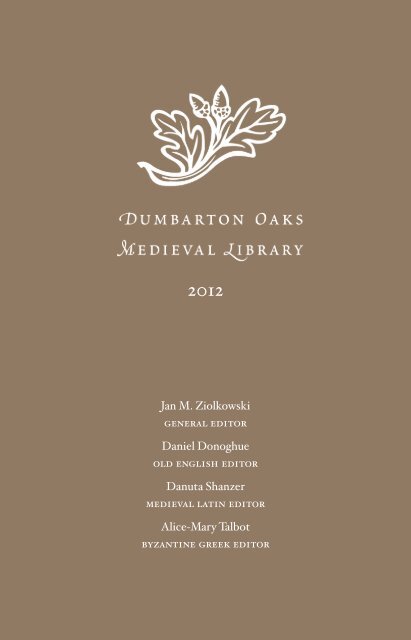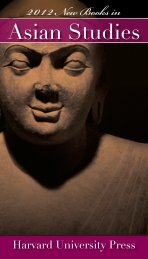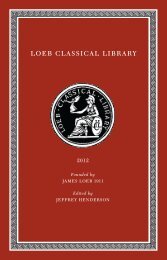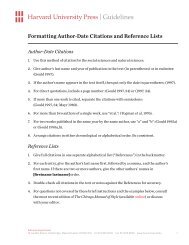Dumbarton Oaks Medieval Library 2012 - Harvard University Press
Dumbarton Oaks Medieval Library 2012 - Harvard University Press
Dumbarton Oaks Medieval Library 2012 - Harvard University Press
You also want an ePaper? Increase the reach of your titles
YUMPU automatically turns print PDFs into web optimized ePapers that Google loves.
<strong>2012</strong><br />
Jan M. Ziolkowski<br />
general editor<br />
Daniel Donoghue<br />
old english editor<br />
Danuta Shanzer<br />
medieval latin editor<br />
Alice-Mary Talbot<br />
byzantine greek editor
THE VULGATE BIBLE<br />
Volume V: The Minor Prophetical Books and<br />
Maccabees: Douay-Rheims Translation<br />
Edited by Angela M. Kinney<br />
Introduction by Swift Edgar<br />
This is the fifth volume of a projected six-volume<br />
Vulgate Bible. Compiled and translated in large part<br />
by Saint Jerome at the turn of the fifth century CE,<br />
the Vulgate Bible permeated the Western Christian<br />
tradition through the twentieth century. It influenced<br />
literature, art, music, and education, and its<br />
contents lay at the heart of Western theological,<br />
intellectual, artistic, and political history through<br />
the Renaissance. At the end of the sixteenth<br />
century, professors at a Catholic college first<br />
at Douay, then at Rheims, translated<br />
the Vulgate Bible into English to<br />
combat the influence of Protestant<br />
vernacular Bibles.<br />
Volume V presents the twelve<br />
minor prophetical books of the<br />
Old Testament, as well as two<br />
deuterocanonical books, 1 and 2<br />
Maccabees. While Jewish communities<br />
regarded the works of the<br />
twelve minor prophets as a single<br />
unit (the Dodecapropheton), the<br />
Vulgate Bible treats them individually<br />
in accordance with Christian tradition.<br />
The themes of judgment<br />
and redemption featured prominently<br />
in the major prophets<br />
(Volume IV) are further developed<br />
by the minor prophets. The books<br />
of 1 and 2 Maccabees conclude the<br />
volume. Their doctrinal controversies<br />
and highly influential martyrdom narratives<br />
anticipate the development of Christian hagiography<br />
both as a genre and as a theological vehicle.<br />
2 WWW.HUP.HARVARD.EDU/DOML<br />
N E W T I T L E S<br />
Vol. I: The Pentateuch<br />
DOML 1 2010 1,200 pp.<br />
Cloth $29.95 / £19.95 ISBN 978-0-674-05534-6<br />
Vol. II: The Historical Books: Part A<br />
DOML 4 2011 1,168 pp. Cloth $29.95 / £19.95 ISBN 978-0-674-99667-0<br />
Vol. II: The Historical Books: Part B<br />
DOML 5 2011 816 pp. Cloth $29.95 / £19.95 ISBN 978-0-674-06077-7<br />
Vol. III: The Poetical Books<br />
DOML 8 2011 1,232 pp. Cloth $29.95 / £19.95 ISBN 978-0-674-99668-7<br />
Vol. IV: The Major Prophetical Books<br />
DOML 13 <strong>2012</strong> 1,168 pp. Cloth $29.95 / £19.95 ISBN 978-0-674-99669-4<br />
Vol. V: The Minor Prophetical Books and Maccabees<br />
DOML 17 <strong>2012</strong> 672 pp. Cloth $29.95 / £19.95 ISBN 978-0-674-06635-9<br />
THE OLD ENGLISH BOETHIUS<br />
with Verse Prologues and Epilogues<br />
Associated with King Alfred<br />
Edited and translated by<br />
Susan Irvine and Malcolm R. Godden<br />
The Old English Boethius boldly refashions in Anglo-<br />
Saxon guise a great literary monument of the Late<br />
Antique world, The Consolation of Philosophy.<br />
Condemned to death for treason around 525 CE,<br />
the Roman scholar Boethius turned to philosophy<br />
to transform his personal distress into a powerful<br />
meditation on fate, free will, and the human capacity<br />
for virtue in a flawed, fallen world. Boethius’s<br />
Latin dialogues found a receptive audience in<br />
Anglo-Saxon England, where they were translated<br />
into Old English some time around 900. The translator<br />
(traditionally identified with<br />
King Alfred) freely adapts the<br />
Latin for a new audience: the<br />
Roman Fabricius, for example,<br />
becomes the Germanic weaponsmith<br />
Weland. The translation<br />
replicates Boethius’s alternation<br />
of prose and verse—only in this<br />
case Old English prose alternates<br />
with alliterative verse.<br />
In later centuries Chaucer and<br />
Queen Elizabeth each turned<br />
The Consolation of Philosophy into<br />
English, but the Old English translation<br />
was the first to bring it to a<br />
wider vernacular audience. Verse<br />
prologues and epilogues for works<br />
traditionally associated with King<br />
Alfred fill out the volume, offering readers a fascinating<br />
glimpse of the moment when English confidently<br />
claimed its birthright as a literature capable<br />
of anything, from sublime ideas to subtle poetry.<br />
DOML 19 <strong>2012</strong> 480 pp.<br />
Cloth $29.95 / £19.95 ISBN 978-0-674-05558-2
ONE HUNDRED LATIN HYMNS<br />
Ambrose to Aquinas<br />
Edited and translated by<br />
Peter G. Walsh with Christopher Husch<br />
“How I wept at your hymns and songs, keenly<br />
moved by the sweet-sounding voices of your<br />
church!” wrote the recently converted Augustine<br />
in his Confessions. Christians from the earliest<br />
period consecrated the hours of the day and the<br />
sacred calendar, liturgical seasons and festivals of<br />
saints. This volume collects one hundred of the<br />
most important and beloved Late Antique and<br />
<strong>Medieval</strong> Latin hymns from Western Europe.<br />
These religious voices span a geographical<br />
range that stretches from Ireland through<br />
France to Spain and Italy. They<br />
meditate on the ineffable, from<br />
Passion to Paradise, in love and<br />
trembling and praise. The authors<br />
represented range from Ambrose in<br />
the late fourth century CE down to<br />
Bonaventure in the thirteenth. The<br />
texts cover a broad gamut in their<br />
poetic forms and meters. Although<br />
the music has often not survived,<br />
most of them would have been<br />
sung. Some of them have continued<br />
to inspire composers, such as the<br />
great thirteenth-century hymns,<br />
the Stabat mater and Dies irae.<br />
DOML 18 <strong>2012</strong> 544 pp.<br />
Cloth $29.95 / £19.95<br />
ISBN 978-0-674-05773-9<br />
N E W T I T L E S<br />
THE HISTORY<br />
MICHAEL ATTALEIATES<br />
Translated by Anthony Kaldellis and Dimitris Krallis<br />
In 1039 Byzantium was the most powerful<br />
empire in Europe and the Near East, controlling<br />
the Balkans south of the Danube and all of Asia<br />
Minor into Armenia and Syria. By 1079 it had<br />
become a politically unstable state half the size,<br />
menaced by powerful enemies on all sides. The<br />
History of Michael Attaleiates is our main source<br />
for this astonishing reversal, and offers a gripping<br />
narrative of the foreign and civil wars of those years.<br />
Attaleiates was a highly placed legal and military<br />
official of the empire with firsthand knowledge<br />
of the events he describes. He knew many of the<br />
emperors and includes an eyewitness account of the<br />
battle of Mantzikert (1071), where<br />
the Seljuk Turks crushed the<br />
Byzantine armies and opened the<br />
door for the permanent Turkish<br />
conquest of Asia Minor. He also<br />
provides vivid narratives of civil<br />
unrest and decries the corruption<br />
and economic exploitation of his<br />
society, looking to the heroes of<br />
the Roman Republic for models<br />
of nobility.<br />
Michael Attaleiates’ History has<br />
never before been translated into<br />
English. The present translation,<br />
based on the most recent critical<br />
edition, makes the text accessible<br />
through its notes, maps, and glossary<br />
of Byzantine terms.<br />
DOML 16 <strong>2012</strong> 5 maps 688 pp.<br />
Cloth $29.95 / £19.95<br />
ISBN 978-0-674-05799-9<br />
WWW.HUP.HARVARD.EDU/DOML 3
OLD ENGLISH SHORTER POEMS<br />
Volume I: Religious and Didactic<br />
Edited and translated by Christopher A. Jones<br />
Alongside famous long works such as Beowulf, Old<br />
English poetry offers a large number of shorter<br />
compositions, many of them on explicitly Christian<br />
themes. This volume of the <strong>Dumbarton</strong> <strong>Oaks</strong><br />
<strong>Medieval</strong> <strong>Library</strong> presents twenty-nine of these<br />
shorter religious poems composed in Old and early<br />
Middle English between the seventh and twelfth<br />
centuries. Among the texts, which demonstrate the<br />
remarkable versatility of early English verse, are colorful<br />
allegories of the natural world, poems dedicated<br />
to Christian prayer and morality, and powerful<br />
meditations on death, judgment, heaven, and hell.<br />
This volume aims to offer this<br />
important body of texts to a wider<br />
audience by bringing them together<br />
in one collection and providing<br />
all of them with up-to-date translations<br />
and explanatory notes. An<br />
introduction sets the poems in<br />
their literary-historical contexts,<br />
which are further illustrated by two<br />
appendices, including the first<br />
complete modern English translation<br />
of the so-called Old English<br />
Benedictine Office.<br />
DOML 15 <strong>2012</strong> 496 pp.<br />
Cloth $29.95 / £19.95<br />
ISBN 978-0-674-05789-0<br />
4 WWW.HUP.HARVARD.EDU/DOML<br />
N E W T I T L E S<br />
APOCALYPSE<br />
PSEUDO-METHODIUS<br />
AN ALEXANDRIAN<br />
WORLD CHRONICLE<br />
Edited and translated by Benjamin Garstad<br />
The Apocalypse of Pseudo-Methodius was one of the<br />
first works composed in response to the Arab invasions<br />
and the establishment of the Muslim empire<br />
in the seventh century. In a matter of decades, it<br />
was translated from its original Syriac into Greek<br />
and from Greek into Latin. (Both the Greek and<br />
Latin texts are presented here.) The Apocalypse<br />
enjoyed popularity throughout the Middle Ages,<br />
informing expectations of the end of the world,<br />
responses to strange and exotic invaders like the<br />
Mongols and Turks, and even the<br />
legendary versions of the life of<br />
Alexander the Great. An<br />
Alexandrian World Chronicle<br />
(Excerpta Latina Barbari) was considered<br />
important by no less a<br />
humanist than Joseph Scaliger. He<br />
recognized it as a representative of<br />
an early stage in the Christian<br />
chronicle tradition that would<br />
dominate medieval historiography.<br />
Presenting a universal chronicle<br />
with a comprehensive ethnography<br />
and geography, the Excerpta offer a<br />
Euhemeristic narrative of the gods<br />
and different account of Alexander.<br />
DOML 14 <strong>2012</strong> 464 pp.<br />
Cloth $29.95 / £19.95<br />
ISBN 978-0-674-05307-6<br />
MIRACLE TALES FROM BYZANTIUM<br />
Translated by Alice-Mary Talbot and Scott Fitzgerald Johnson<br />
Miracles occupied a unique place in medieval and Byzantine life and thought. This volume makes available<br />
three collections of miracle tales never before translated into English. Together, the collections offer an<br />
exceptional variety of miracles from the Byzantine era.<br />
First are the fifth-century Miracles of Saint Thekla. Legendary female companion of the Apostle Paul, Thekla<br />
counted among the most revered martyrs of the early church. Her Miracles depict activities in a healing<br />
shrine at a time when Christianity was still supplanting traditional religion. A half millennium later comes<br />
the tenth-century Miracles of the Spring of the Virgin Mary, which describes how the waters at this shrine outside<br />
Constantinople healed emperors, courtiers, and churchmen. Complementing the first two collections<br />
are the Miracles of Saint Gregory Palamas, fourteenth-century archbishop of Thessalonike. Written by the gifted<br />
hagiographer of his era (Philotheos Kokkinos), this account tells of healings that Palamas performed, both<br />
while alive and once dead. It allows readers to witness the development of a saint’s cult in late Byzantium.<br />
Saints and their miracles were essential components of faith in medieval and Byzantine culture. These collections<br />
deepen our understanding of attitudes toward miracles. Simultaneously, they display a remarkable range<br />
of registers in which Greek could be written during the still little-known Byzantine period.<br />
DOML 12 <strong>2012</strong> 480 pp. Cloth $29.95 / £19.95 ISBN 978-0-674-05903-0
HISTORIES<br />
Volume I: Books 1–2<br />
Volume II: Books 3–4<br />
RICHER OF SAINT-RÉMI<br />
Edited and translated by Justin Lake<br />
The Historia of Richer of Saint-Rémi (ca. 950–<br />
ca. 1000), an invaluable source for understanding<br />
tenth-century West Francia (present-day France),<br />
provides a rare contemporary account of the waning<br />
Carolingian dynasty, accession of Hugh Capet,<br />
and failed rebellion of Charles of Lorraine. The<br />
Historia surveys a tumultuous century in which two<br />
competing dynasties struggled for supremacy, while<br />
great magnates seized upon the opportunity to<br />
carve out their own principalities. Richer tells<br />
of synods and coronations, deception<br />
and espionage, battles and<br />
sieges, disease and death, and even<br />
the difficulties of travel. Translated<br />
into English here for the first time,<br />
the Historia holds particular attractions<br />
for historians and for anyone<br />
interested in the cultural and intellectual<br />
developments in the Latin<br />
West around the year 1000.<br />
Vol. I: Books 1–2<br />
DOML 10 2011 448 pp.<br />
Cloth $29.95 / £19.95<br />
ISBN 978-0-674-06003-6<br />
Vol. II: Books 3–4<br />
DOML 11 2011 1 line illus. 496 pp.<br />
Cloth $29.95 / £19.95<br />
ISBN 978-0-674-06159-0<br />
OLD TESTAMENT NARRATIVES<br />
Edited and translated by Daniel Anlezark<br />
R E C E N T LY P U B L I S H E D<br />
SATIRES<br />
SEXTUS AMARCIUS<br />
Translated by Ronald E. Pepin<br />
EUPOLEMIUS<br />
Edited and translated by Jan M. Ziolkowski<br />
Composed in Germany by a monastic poet<br />
steeped in classical lore and letters, the Satires of<br />
Amarcius (Sextus Amarcius Gallus Piosistratus)<br />
unrelentingly attack both secular vices and ecclesiastical<br />
abuses of the late eleventh century. The<br />
verses echo Horace and Prudentius, are laced with<br />
proverbs and polemic, and vividly portray aspects<br />
of contemporary life—the foppery of young<br />
nobles, the vainglory of the nouveaux riches,<br />
the fastidiousness of debauched gluttons. This is<br />
the first translation of the Satires<br />
into any modern language.<br />
The Eupolemius is a late-eleventhcentury<br />
Latin epic that recasts salvation<br />
history, from Lucifer’s fall<br />
through Christ’s resurrection, fusing<br />
Greek and Hebrew components<br />
within a uniquely medieval<br />
framework. The poem was composed<br />
by an anonymous German<br />
monk, possibly the author who<br />
used the pseudonym Amarcius.<br />
Although it focuses on events of<br />
both the Hebrew Bible and New<br />
Testament, it is also rooted in its<br />
own momentous times.<br />
DOML 9 2011 448 pp.<br />
Cloth $29.95 / £19.95<br />
ISBN 978-0-674-06002-9<br />
The Old English poems in this volume are among the first retellings of scriptural texts in a European vernacular.<br />
More than simple translations, they recast the familiar plots in daringly imaginative ways, from<br />
Satan’s seductive pride (anticipating Milton), to a sympathetic yet tragic Eve, to Moses as a headstrong<br />
Germanic warrior-king, to the lyrical nature poetry in Azarias.<br />
Whether or not the legendary Caedmon authored any of the poems in this volume, they represent traditional<br />
verse in all its vigor. Three of them survive as sequential epics in a manuscript in the Bodleian <strong>Library</strong><br />
at Oxford. The first, the Old English Genesis, recounts biblical history from creation and the apocryphal<br />
fall of the angels to the sacrifice of Isaac; Abraham emerges as the central figure struggling through exile<br />
toward a lasting covenant with God. The second, Exodus, follows Moses as he leads the Hebrew people out<br />
of Egyptian slavery and across the Red Sea. Both Abraham and Moses are transformed into martial heroes<br />
in the Anglo-Saxon mold. The last in the triad, Daniel, tells of the trials of the Jewish people in Babylonian<br />
exile up through Belshazzar’s feast. Azarias, the final poem in this volume (found in an Exeter Cathedral<br />
manuscript), relates the apocryphal episode of the three youths in Nebuchadnezzar’s furnace.<br />
DOML 7 2011 368 pp. Cloth $29.95 / £19.95 ISBN 978-0-674-05319-9<br />
WWW.HUP.HARVARD.EDU/DOML 5
THE RULE OF SAINT BENEDICT<br />
BENEDICT OF NURSIA<br />
Edited and translated by Bruce L. Venarde<br />
One of the most influential texts in the Middle<br />
Ages, The Rule of Saint Benedict offers guidance<br />
about both the spiritual and organizational dimensions,<br />
from the loftiest to the lowliest, of monastic<br />
life. This new Latin-English edition has features of<br />
interest for first-time readers of the Rule as well as<br />
for scholars of medieval history and language.<br />
The Latin text is a transcription of manuscript 914<br />
of the Abbey of St. Gall (Switzerland), an early<br />
ninth-century copy regarded as the version that<br />
most closely reproduces Benedict’s style. The saint’s<br />
idiom was informal, sometimes conversational, and<br />
heavily influenced by the spoken<br />
Latin of the sixth century CE. In<br />
the Rule his voice and thought<br />
processes come through in all their<br />
strength and humanity. Readers will<br />
find background to the monastic<br />
life in the notes. This volume also<br />
includes texts and translations of<br />
two letters that explain the origins<br />
of the St. Gall version as well as an<br />
index to all the translated materials.<br />
DOML 6 2011 304 pp.<br />
Cloth $29.95 / £19.95<br />
ISBN 978-0-674-05304-5<br />
6 WWW.HUP.HARVARD.EDU/DOML<br />
R E C E N T LY P U B L I S H E D<br />
THE BEOWULF MANUSCRIPT<br />
Complete Texts and The Fight at Finnsburg<br />
Edited and translated by R. D. Fulk<br />
Beowulf is one of the finest works of vernacular<br />
literature from the European Middle Ages. For<br />
the first time in the history of Beowulf scholarship,<br />
the poem appears alongside the other four<br />
texts from its sole surviving manuscript: the prose<br />
Passion of Saint Christopher, The Wonders of the East,<br />
The Letter of Alexander the Great to Aristotle, and<br />
(following Beowulf) the poem Judith. First-time<br />
readers as well as established scholars can now<br />
gain new insights into Beowulf—and the four<br />
other texts—by approaching each in its original<br />
context.<br />
“An inspired project. R. D. Fulk<br />
is one of the world’s leading<br />
Beowulfians…Fulk has produced<br />
an elegant, slightly archaized prose<br />
version of the poem that keeps to<br />
the same register for all the items<br />
in the manuscript…This delightful<br />
book is a particularly graceful member<br />
of the beautifully produced<br />
<strong>Dumbarton</strong> <strong>Oaks</strong> series.”<br />
—BERNARD O’DONOGHUE,<br />
Times Literary Supplement<br />
DOML 3 2010 400 pp.<br />
Cloth $29.95 / £19.95<br />
ISBN 978-0-674-05295-6<br />
THE ARUNDEL LYRICS. THE POEMS OF HUGH PRIMAS<br />
Edited and translated by Christopher J. McDonough<br />
This volume presents two complementary medieval anthologies containing lyrics by two outstanding Latin<br />
poets of the second half of the twelfth century. The poet Peter of Blois was proclaimed by a contemporary<br />
of his to be a master composer of rhythmic verse. Peter’s secular love-lyrics gathered in the Arundel manuscript<br />
give substance to that claim. Written with a technical virtuosity that rivals the metrical display of<br />
Horatian lyric, the poems give eloquent and learned expression to the cult of secular love that emerged in<br />
the twelfth century. The collection is further augmented by verse as varied as Christmas poems and satires<br />
on the venality of the Roman Curia and immoral bishops, including a famous lament about church corruption<br />
by Walther of Châtillon.<br />
“The material in the volume repays study and the scholarly apparatus is impressive…This volume should receive<br />
a warm welcome. [The <strong>Dumbarton</strong> <strong>Oaks</strong> <strong>Medieval</strong> <strong>Library</strong>] will be a boon to professional medievalists, their<br />
students and the general reader, and every good library ought to own the series.”<br />
—KEITH SIDWELL, Times Literary Supplement<br />
DOML 2 2010 336 pp. Cloth $29.95 / £19.95 ISBN 978-0-674-05557-5
O R D E R F O R M<br />
Order now to take advantage of this free postage offer.<br />
Using the reply envelope enclosed with this mailing, complete, clip, and mail the coupon below.<br />
If paying by credit card, you may CALL us toll-free: 1-800-405-1619 (be sure to mention the six-digit key code above<br />
your mailing address to receive free postage). You may also FAX your order toll-free: 1-800-406-9145.<br />
Please use this form to order, and mail it to us before September 1, 2013.<br />
Qty. ISBN Author/Title Price<br />
Postage and handling (before 9/1/2013) $ FREE<br />
If ordering by phone,<br />
mention discount code<br />
Residents of the states listed below must include sales tax $<br />
H55204<br />
Canadian orders only: 5% GST<br />
(You will not be charged Canada Post’s handling fee)<br />
$<br />
Name<br />
Address<br />
TOTAL PAYMENT $<br />
City State Zip<br />
Daytime phone ( ) 6-digit code from mailing label<br />
❑ Check or money order enclosed (payable to <strong>Harvard</strong> <strong>University</strong> <strong>Press</strong>) ❑e) ❑q) ❑y<br />
Account no.<br />
bbbbbbbbbbbbbbbb<br />
Expiration date<br />
bbbb<br />
Signature (required)<br />
Prices subject to change. Offer good in the U.S. and<br />
Canada only.<br />
All orders from individuals must include payment in U.S.<br />
funds, made out to <strong>Harvard</strong> <strong>University</strong> <strong>Press</strong>. Institutions<br />
and libraries may enclose a purchase order.<br />
Account number, expiration date, and signature must<br />
accompany credit card orders.<br />
Sales Tax<br />
Residents of the following states must include sales tax:<br />
CA, CT, DC, FL, GA, IL, IN, KY, MD, MI, MN, NJ,<br />
NM, NY, OH, PA, RI, TX, VA, WI<br />
The <strong>Harvard</strong> Guarantee<br />
If you are not completely satisfied with the books you<br />
order, you may return them within 30 days of receipt for a<br />
full refund or credit to your charge card.<br />
Address Removals & Changes<br />
Mail the entire envelope with the mailing label,<br />
with corrections marked, to<br />
Direct Mail, <strong>Harvard</strong> <strong>University</strong> <strong>Press</strong><br />
79 Garden Street, Cambridge, MA 02138<br />
View our other discipline brochures at<br />
www.hup.harvard.edu/order<br />
WWW.HUP.HARVARD.EDU/DOML 7<br />
H55204 / 50M / 0812
The <strong>Dumbarton</strong> <strong>Oaks</strong> <strong>Medieval</strong> <strong>Library</strong> presents original<br />
Byzantine Greek, <strong>Medieval</strong> Latin, and Old English texts with<br />
facing-page translations designed to make written achievements of<br />
medieval and Byzantine cultures available to English-speaking<br />
scholars and general readers. Aimed at a global audience, it<br />
offers familiar classics of the medieval canon as well as<br />
lesser-known texts of literary and cultural value in<br />
accessible modern translations based on the<br />
latest research by leading figures in the field.<br />
“The <strong>Dumbarton</strong> <strong>Oaks</strong> <strong>Medieval</strong> <strong>Library</strong> is a project of extraordinary<br />
intellectual and cultural value, splendidly edited and handsomely presented.”<br />
—Harold Bloom<br />
dumbarton oaks medieval library<br />
harvard university press<br />
cambridge, massachusetts<br />
london, england<br />
www.hup.harvard.edu/doml






